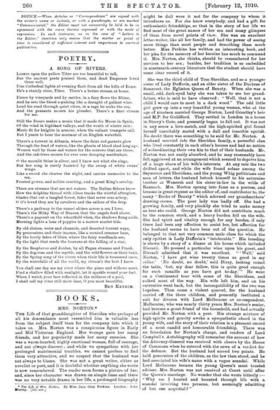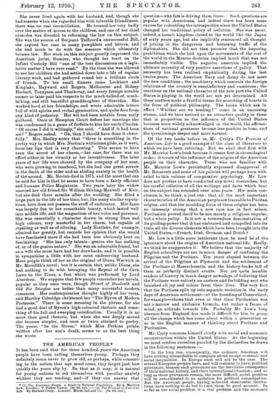BOOKS.
MRS. NORTON.*
THE Life of that granddaughter of Sheridan who perhaps of all his descendants most resembled him is valuable less from the subject itself than for the company into which it takes us. Mrs. Norton was a conspicuous figure in Early and Mid Victorian England. Her wrongs gave her many friends, and her popularity made her many enemies. She was a warm-hearted, highly emotional woman, full of courage, and not always discreet ; and while we sympathise with her prolonged matrimonial troubles, we cannot profess to find them very attractive, and we suspect that the husband was not always to blame. She was not a great writer, either as novelist or poet, and it is doubtful whether anything she wrote is now remembered. The reader soon forms a picture of her, and, since her character was drawn on simple lines and there was no very notable drama in her life, a prolonged biography • The Life of Mrs. Norton. By Miss Jane Grey Perkins. London : John Murray. 1_12s. net.] might be dull were it not for the company to whom it introduces us. For she knew everybody, and bad a gift for enthusiastic friendships, so that in the story of her life we find most of the great names of her era and many glimpses of them from novel points of view. She was an excellent letter-writer, like all her family, and had the power of seeing more things than most people and describing them much better. Miss Perkins has written an interesting book, and her plea for the memory of her heroine has much to commend it. Mrs. Norton, she thinks, should be remembered for her services to her sex ; besides, her tradition is so embedded in nineteenth-century literature that the student should have some clear record of it.
She was the third child of Tom Sheridan, and so a younger- sister of Lady Dufferin, and an elder sister of the Duchess of Somerset, the Eglinton Queen of Beauty. When she was a small, odd, dark-eyed baby she was taken to see her grand- father, who is said to have observed : " Well, that is not a child I would care to meet in a dark wood." The odd little girl grew up into a very beautiful young woman, who at the age of nineteen married George Norton, Lord Grantley's heir and M.P. for Guildford. They settled in London in a house in Storey's Gate, and presently began to fall out. It was not in any sense a love-match, and the high-spirited girl found herself unsuitably mated with a dull and irascible egotist. No doubt there was something to be said for Mr. Norton. A husband married into the Sheridan family, a powerful clan who lived constantly in each other's houses and had no notion of subordinating their own kin to that of their husbands. Mr. Norton was not easily absorbed, and he may reasonably have felt aggrieved at an arrangement which seemed to deprive him of a large share of his wife's interests. At any rate the two drifted apart, and while the wife found solace among the Seytnours and Sheridans, and the young Whig politicians and men of letters, the husband betook himself to his saturnine brother at Wonersh and his sister-in-law in the wilds of Rannoch. Mrs. Norton sprang into fame as a poetess, and became in great request as the editor of, and contributor to, the many " Books of Beauty " which adorned our grandmothers' drawing-rooms. The poor lady was badly off. She had a growing family, and very pluckily she tried to make money as best she could. George Norton did, not contribute much to the common stock, and a heavy burden fell on the wife. She had spirit and vitality enough for any burden, if only there had been any affection to assist her, but affection for the husband seems to have been out of the questian. He belonged to that not very common male class for which the only epithet is Lady Dufferin's "intolerable." His breeding is shown by a story of a dinner at his house which included Disraeli. He pressed a particular wine upon his guest, and Disraeli admitted that it was excellent. " Well,' said Norton, ' I have got wine twenty times as good in my cellar.' No doubt, no doubt,' said Dizzy, looking round the table, but, my dear fellow, this is quite good enough for such canaille as you have got to-day.' " He went on a Continental tour with some of the Sheridans, and sulked most of the way. His wife left him, and on his entreaties went back, but the incompatibility of the two was hopeless. Then came a violent quarrel, for the husband carried off the three children, and presently instituted a suit for divorce with Lord Melbourne as co-respondent. Melbourne, who was nearly thirty years Mrs. Norton's senior, had become a peat friend of the household, and had actually provided Mr. Norton with a post. His strange mixture of high spirits and gravity awoke a sympathetic chord in the young wife, and the story of their relation is a pleasant record of a most candid and honourable friendship. There was no foundation for Norton's charge, and readers of Lord Campbell's Autobiography will remember the account of how the Attorney-General was received with cheers by the House of Commons when he entered with the news of a verdict for the defence. But the husband had scored two points. He held possession of the children, as the law then stood, and he had associated his wife's name with a vague scandal. While Lord Melbourne became the young Queen's most trusted adviser, Mrs. Norton was not received at Court until after the Queen's marriage. No wonder that she wrote bitterly :- " Why am I hunted and haunted through life with a scandal involving two persons, but seemingly admitting of but one acquittal ?" She never lived again with her husband, and, though she had seasons when she regarded him with tolerable friendliness, there was, no real reconciliation. He treated her very badly over the matter of access to the children, and one of her chief crusades was directed to reforming the law on this subject. She was the source of Serjeant Talfourd's unsuccessful Bill, she argued her case in many pamphlets and letters, and she had much to do with the measure which ultimately became law. Her work on this subject greatly impressed the American jurist, Sumner, who thought her tract on the Infant Custody Bill "one of the best discussions on a legis- lative matter I have ever read." By the time she was allowed to see her children she had settled down into a life of regular literary work, and had gathered round her a brilliant circle of friends. To her small dinners came Lockhart and Kinglake, Hayward and Rogers, Melbourne and Sidney Herbert, Tennyson and Thackeray, and every foreign notable sooner or later paid his respects to the much-talked-of, much- talking, and still beautiful granddaughter of Sheridan. She worked hard at her friendships, and wrote admirable letters full of wild spirits and verbal gymnastics, and quite free from any kind of pedantry. Her wit had been notable from early girlhood. Once at Hampton Court before her marriage she was condemned in a game of forfeits to kiss her uncle Charles. " Of course I did it willingly," she said. "And if it had been me P " Rogers asked. " Oh, then I should have done it cheer- fully." Mrs. Shelley notes that "there is something in the pretty way in which Mrs. Norton's witticisms glide, as it were, from her lips that is very charming." This seems to have been the secret of her charm,—her ease, for there was no effort either in her vivacity or her inventiveness. The later years of her life were cheered by the company of her sons, who were growing to manhood, but she had one great sorrow in the death of the elder and an abiding anxiety in the health of the second. Mr. Norton died in 1875, and the most that can be said for him is that he seems to have been a fairly efficient and humane Police Magistrate. Two years later the widow married her old friend Sir William Stirling-Maxwell of Keir, but she died three months after the wedding. She filled a large part in the life of her time, but, like many similar reputa- tions, hers does not possess the stuff of endurance. Her fame was largely due to her remarkable beauty, which lasted well into middle life, and the magnetism of her voice and presence. She was essentially a character drawn in strong lines and high colours, very masterful in her charm, but capable of repelling as well as of alluring. Lady Eastlake, for example, admired her greatly, but records her opinion that she would have fascinated more if she had been less obviously bent on fascinating. "She has only talents : genius she has nothing of, or of the genius nature." She was an admirable friend, but as a wife she must have had her drawbacks, and it is possible to sympathise a little with her most undeserving husband. Most people think of her as the original of Diana Warwick in Mr. Meredith's novel ; but it is certain that, unlike Diana, she had nothing to do with betraying the Repeal of the Corn Laws to the Times, a feat which was performed by Lord Aberdeen. We suppose that few people remember her novels, popular as they once were, though Stuart of Dunleath and Old Sir Douglas are better than many successful modern romances. Her contemporaries thought highly of her verse, and Hartley Coleridge christened her " The Byron of Modern Poetesses." There is some meaning in the phrase, for she had a good deal of Byron's high-coloured rhetoric and some- thing of his full and sweeping versification. Usually it is no
more than good rhetoric, but when she was deeply moved she became simpler, and once or twice attained to poetry.
The poem,' "In the Storm," which Miss Perkins prints, written after her son's death, seems to us the best thing she wrote.











































 Previous page
Previous page